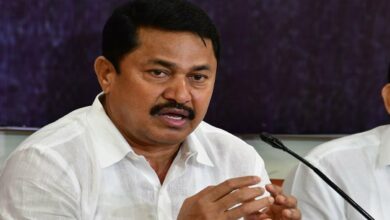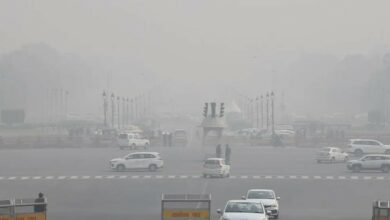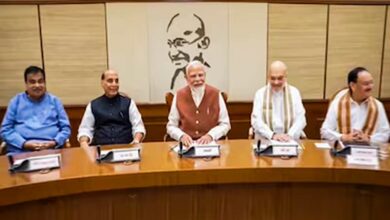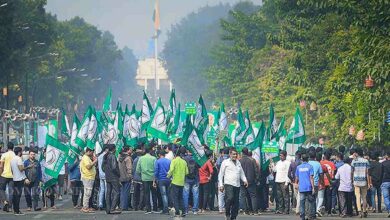Jagadguru Rambhadracharya told this to the Bangladesh government
In reaction to the continued persecution of Hindus and the demolition of temples in Bangladesh, spiritual leader Jagadguru Rambhadracharya on Tuesday urged the Indian government to take decisive action. Speaking out against the present administration of Bangladesh, he called it “anti-Hindu” and said that talks alone would not fix the problem.
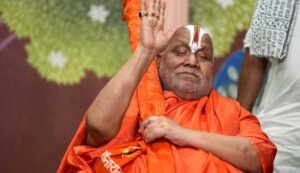
He highlighted the necessity for strict steps to end the atrocities and his worry over the lack of diplomatic discussions to stop the bloodshed in an interview with media. “The government must act decisively immediately due to the destruction of temples and the atrocities being committed against Hindus in Bangladesh,” he added.
For several days, the administration has been in continuous communication with Bangladesh, pleading with them to halt the persecution of Hindus, but the crimes continue. Since they won’t stop without it, strict measures should be implemented in such a circumstance.
Additionally, Rambhadracharya encouraged India to act decisively since talks with Bangladesh won’t fix the problems. “The current government of Bangladesh is anti-Hindu,” he said. You may have heard today that Sheikh Hasina’s return to Bangladesh is being demanded in a letter sent to the Ministry of External Affairs.
India, however, won’t do that. There will only be more differences between Bangladesh and India. Although conversation won’t help, India will need to take decisive measures.
A “Note Verbale” from the Bangladesh High Commission about an extradition request for deposed Prime Minister Sheikh Hasina was verified by the Ministry of External Affairs earlier on Monday.
The Ministry, however, declined to comment on the issue. “We confirm that we received a Note Verbale from the Bangladesh High Commission today in connection with an extradition request,” said a MEA spokeswoman. We don’t currently have anything to say about this.
A “note verbale” was sent to the Indian government with the request. The incident was verified by Touhid Hossain, the Foreign Affairs Advisor to the Interim Government of Bangladesh, who said, “We have sent a note verbale to India requesting the return of Sheikh Hasina.”
After being overthrown by a student-led revolution, Sheikh Hasina escaped to India on August 5 and is still there. Beginning in early July, the movement resulted in conflicts and violent demonstrations that killed more than 600 people. An temporary administration headed by Nobel Laureate Muhammad Yunus was established after Hasina’s resignation.
Hasina said Muhammad Yunus was the “mastermind” of the student demonstrations that resulted in her dismissal earlier on December 9. She said that a well thought-out campaign to topple her administration included the demonstrations.
Hasina also described the interim government’s response to the crisis as “fascist” and said that the rights of the Bangladeshi people were being violated.
Hasina also denounced the detention of former ISKCON priest Chinmoy Krishna Das on accusations of sedition, claiming that he was denied the right to counsel. This, she said, showed that there is no law and order in Bangladesh. “They said that Chinmoy Krishna Das could not have a lawyer defending him, therefore they arrested him. What justice does this represent? This demonstrates that there is no law and order in Bangladesh,” she said.
Hasina has accused the interim administration of denying the people their rights, and the atmosphere in Bangladesh is still tense. Concerned about the ramifications of Hasina’s possible extradition, the international community is keeping a careful eye on the situation.


